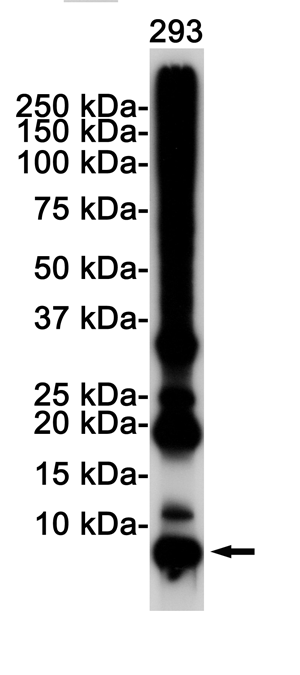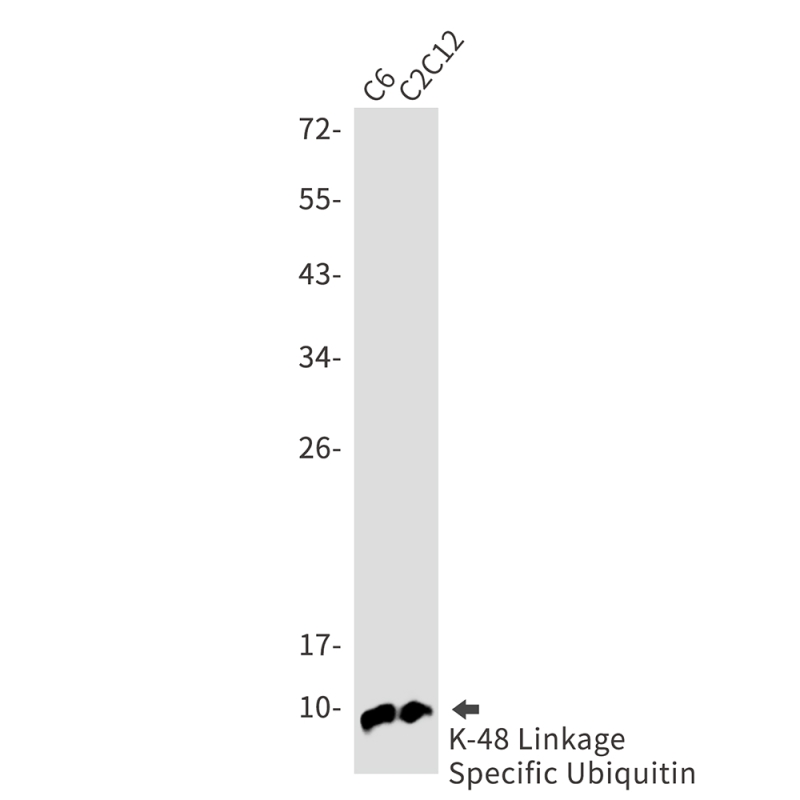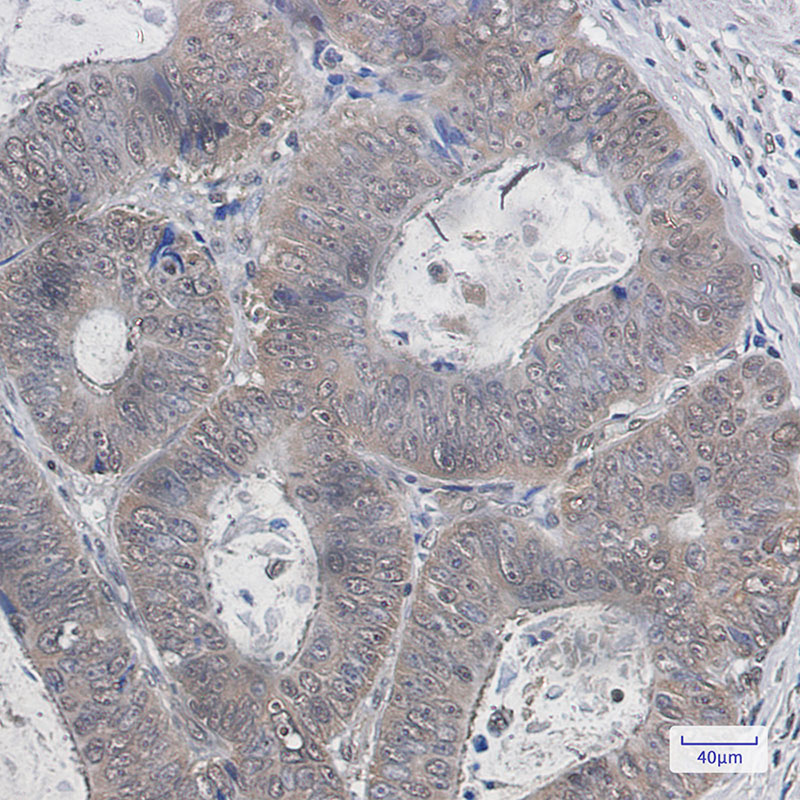


| WB | 1/500-1/1000 | Human,Mouse,Rat |
| IF | 咨询技术 | Human,Mouse,Rat |
| IHC | 1/50-1/100 | Human,Mouse,Rat |
| ICC | 1/50-1/200 | Human,Mouse,Rat |
| FCM | 咨询技术 | Human,Mouse,Rat |
| Elisa | 咨询技术 | Human,Mouse,Rat |
| Aliases | FLJ25987; MGC8385; ubiquitin B; Ubiquitin; UBCEP1; UBCEP2; RPS27A |
| Entrez GeneID | 7314 |
| WB Predicted band size | Refer to figures |
| Host/Isotype | Rabbit IgG |
| Antibody Type | Primary antibody |
| Storage | Store at 4°C short term. Aliquot and store at -20°C long term. Avoid freeze/thaw cycles. |
| Species Reactivity | Human,Mouse,Rat |
| Immunogen | A synthetic peptide of human K-48 Linkage Specific Ubiquitin |
| Formulation | Purified antibody in TBS with 0.05% sodium azide,0.05%BSA and 50% glycerol. |
+ +
以下是关于Ubiquitin K48抗体的3篇代表性文献,按研究领域分类列举:
1. **文献名称**:*Distinct roles for K48 and K29 ubiquitin chains in proteasomal degradation*
**作者**:Hershko, A., Ciechanover, A., & Rose, I.A. (2001)
**摘要**:早期研究揭示K48连接的泛素链是蛋白酶体降解的主要信号,该研究通过体外泛素化系统验证了K48抗体的特异性,并对比了其他链类型(如K29)的功能差异。
2. **文献名称**:*Polyubiquitin linkage-specific antibodies reveal differential roles of ubiquitin chains in disease*
**作者**:Dammer, E.B., et al. (2011)
**摘要**:开发了K48/K63链特异性单克隆抗体,通过质谱和免疫印迹验证抗体特异性,并应用于阿尔茨海默病脑组织分析,证明K48链在异常蛋白聚集中的关键作用。
3. **文献名称**:*Myc regulates c-Myc protein stability through K48-linked ubiquitination*
**作者**:Nathan, J.A., et al. (2008)
**摘要**:利用K48特异性抗体证明c-Myc蛋白通过K48泛素化被蛋白酶体降解,揭示了癌细胞中异常泛素化调控的分子机制。
**应用提示**:
K48抗体常用于检测蛋白酶体靶向的泛素化底物(如IP/WB),上述文献覆盖抗体开发(Dammer, 2011)、肿瘤(Nathan, 2008)和神经疾病(Dammer, 2011)等经典研究方向。近期研究可关注抗体在新型降解技术(PROTAC)中的应用。
Ubiquitin K48 antibody is a specialized tool used to study the ubiquitin-proteasome system, a critical pathway for protein degradation in eukaryotic cells. Ubiquitin, a 76-amino acid protein, can form polyubiquitin chains through covalent linkages between its lysine residues. The K48-linked chain is a well-characterized signal targeting proteins to the 26S proteasome for degradation. This specific linkage is formed via an isopeptide bond between the glycine carboxyl group of one ubiquitin and the ε-amino group of lysine 48 (K48) on another ubiquitin molecule.
The K48-specific antibody recognizes this distinct topological structure, enabling researchers to detect proteins marked for proteasomal degradation. It has become essential in studying cellular processes like protein quality control, cell cycle regulation, and stress responses. Applications include Western blotting, immunoprecipitation, and immunofluorescence to visualize K48-polyubiquitinated substrates under various experimental conditions, such as proteasome inhibition or disease states.
As dysregulated ubiquitination is implicated in cancer, neurodegenerative diseases (e.g., Alzheimer's, Parkinson's), and inflammatory disorders, this antibody serves as a vital diagnostic and research tool. Validation using ubiquitin linkage-specific deubiquitinases or K48R mutant controls is crucial to confirm antibody specificity, given the structural similarity between different ubiquitin chain types.
×